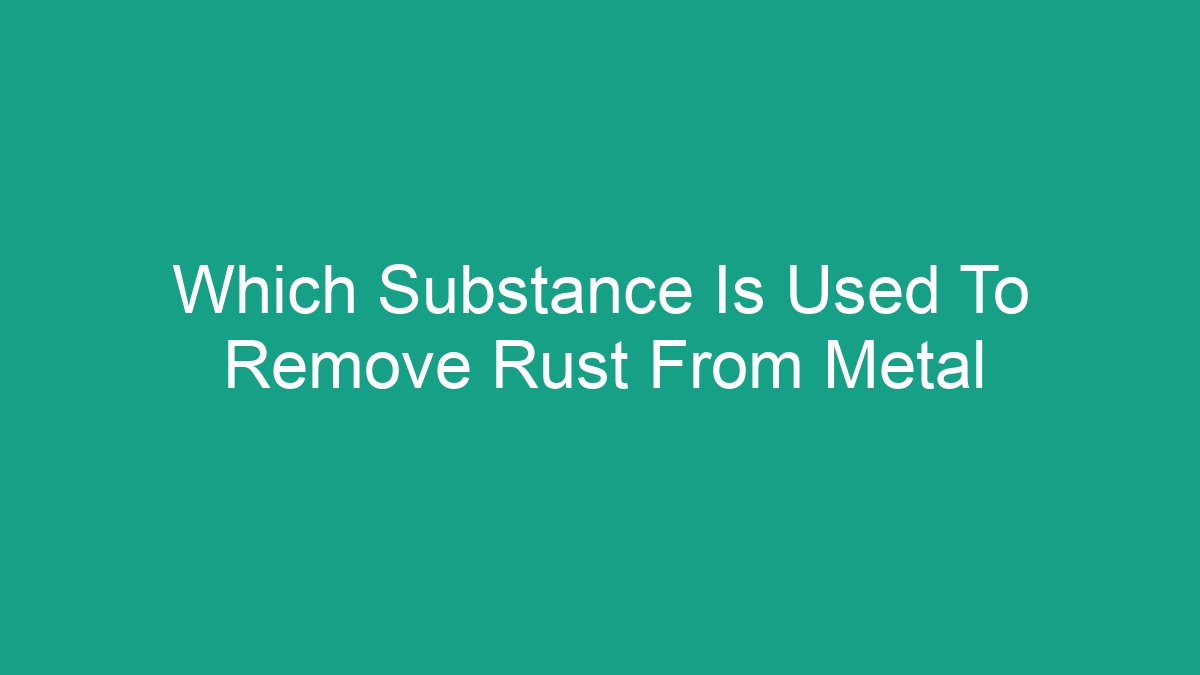
When it comes to maintaining metal items, one of the most common issues that individuals face is rust. Rust can negatively impact the appearance and functionality of metal objects, making it essential to find an effective method for removing it. There are several substances that are commonly used to remove rust from metal, each with its own unique benefits and drawbacks. In this article, we will explore some of the most popular substances used for rust removal, and discuss the best practices for using them.
1. White Vinegar
White vinegar is a mild acid that can be used to remove rust from metal. It works by dissolving the rust and making it easier to scrub away. To use white vinegar for rust removal, simply soak the rusted item in a bowl of vinegar for several hours or overnight. Once the rust has softened, you can scrub it away with a brush or a piece of steel wool. White vinegar is an affordable and non-toxic option for removing rust, making it a popular choice for many people.
2. Baking Soda
Baking soda is another household item that can be used to remove rust from metal. It is mildly abrasive, making it effective at scrubbing away rust without causing damage to the metal. To use baking soda for rust removal, create a paste by mixing baking soda with water, and apply it to the rusted area. Let the paste sit for a few hours, then scrub it away with a brush or a piece of steel wool. Baking soda is a gentle and eco-friendly option for rust removal, making it suitable for delicate items.
3. Lemon Juice
Lemon juice contains citric acid, which is effective at breaking down rust and corrosion. To use lemon juice for rust removal, simply squeeze the juice of a lemon onto the rusted area and let it sit for a few hours. Once the rust has softened, you can scrub it away with a brush or a piece of steel wool. Lemon juice is a natural and non-toxic option for rust removal, and it leaves behind a pleasant citrus scent.
4. Rust Converter
Rust converter is a commercial product that is specifically designed to convert rust into a protective coating. It contains tannic acid, which reacts with iron oxide (rust) to form a stable, black substance that prevents further corrosion. To use rust converter, simply apply it to the rusted area and let it dry. Once the rust has been converted, you can paint over the area to provide additional protection. Rust converter is a convenient and long-lasting option for rust removal, making it ideal for large or heavily rusted items.
5. Naval Jelly
Naval jelly is a gel-like substance that contains phosphoric acid, which is effective at dissolving rust. It can be applied to rusted metal surfaces and left on for a short period of time before being scrubbed away. Naval jelly is especially useful for removing heavy rust from small or intricate items, such as tools or hardware. However, it is important to use caution when working with naval jelly, as it can be corrosive and should be handled with care.
Best Practices for Rust Removal
Regardless of which substance you choose to use for rust removal, there are a few best practices that you should follow to ensure effective and safe results:
- Protective Gear: When working with substances that contain acid or other chemicals, it is important to wear gloves, goggles, and a face mask to protect yourself from exposure.
- Test Spot: Before applying any substance to a large area, it is a good idea to test it on a small, inconspicuous spot to ensure that it does not cause damage to the metal.
- Thorough Rinse: After removing the rust, be sure to thoroughly rinse the metal item with water to remove any residue from the cleaning substance.
- Prevent Future Rust: Once the rust has been removed, consider applying a protective coating (such as paint or wax) to prevent future rust formation.
Conclusion
There are several substances that can be used to remove rust from metal, each with its own unique advantages. Whether you prefer to use household items like white vinegar and baking soda, or commercial products like rust converter and naval jelly, it is important to follow best practices for safe and effective rust removal. By taking proper precautions and choosing the right substance for your specific needs, you can effectively restore your metal items to their original condition.
FAQs
Q: Is it safe to use these substances on all types of metal?
A: While the substances mentioned in this article are generally safe for use on most types of metal, it is important to test them on a small area before applying them to a larger surface, especially for delicate or valuable items. In addition, take special care when using substances that contain acid, as they can cause damage to certain metals.
Q: Can I use these methods for rust removal on outdoor metal items?
A: Yes, these methods can be used for rust removal on outdoor metal items, such as garden tools, patio furniture, and metal fences. However, it is important to consider the environmental impact of disposing of cleaning substances, and to take precautions to prevent harm to plants and wildlife.
Q: How can I prevent rust from forming on metal items in the future?
A: To prevent rust from forming on metal items, it is important to keep them clean and dry, especially if they are exposed to moisture or humidity. Applying a protective coating, such as paint, wax, or oil, can also help to prevent rust formation.



